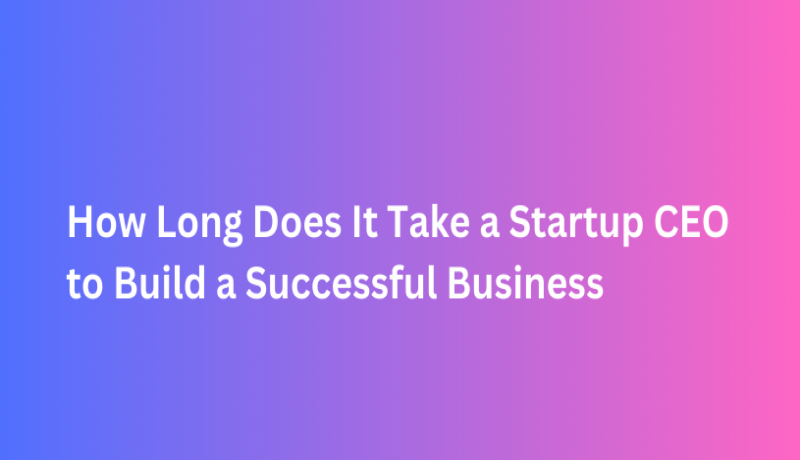How Long Does It Take a Startup CEO to Build a Successful Business
The time it takes for a startup CEO to build a successful business can vary widely and is influenced by numerous factors. There is no one-size-fits-all answer, as success is defined differently for each business and industry.
Some businesses prioritize rapid growth and market share acquisition over immediate profitability. Additionally, businesses might operate at a break-even point or with small profits initially, reinvesting earnings for future growth.
There is no universal timeframe for a business to become profitable, and it can range from a few months to several years. It often requires careful planning, effective execution, and a focus on delivering value to customers.
Some startups may achieve success relatively quickly, while others may take years.
Several factors can impact the timeline:
Industry and Market Conditions: The industry in which the startup operates and current market conditions play a significant role. Some industries may have faster growth trajectories, while others may require more time to establish a presence.
Business Model: The nature of the business model can also affect the time it takes to achieve success. For example, a software-as-a-service (SaaS) startup might scale more rapidly than a traditional brick-and-mortar business.
Product or Service Innovation: The uniqueness and innovation of the product or service can influence success. If the startup offers something novel and in-demand, it may gain traction faster.
Execution and Leadership: The effectiveness of the leadership team, particularly the CEO, in executing the business plan, adapting to challenges, and making strategic decisions is crucial. Strong leadership can expedite success.
Funding and Resources: The availability of funding and resources can significantly impact a startup's growth. Sufficient capital allows for marketing, hiring, and product development, all of which contribute to success.
Market Adoption: The speed at which the market adopts the product or service plays a vital role. Sometimes, it takes time for consumers or businesses to recognize the value and adopt new solutions.
Competition: The level of competition in the market can affect how quickly a startup can gain market share. A crowded market may require more effort and time to stand out.
Startup Costs: The initial investment and startup costs play a crucial role. Businesses with high upfront costs, such as manufacturing or those requiring extensive research and development, may take longer to become profitable compared to low-cost service-oriented businesses.
Marketing and Branding: The effectiveness of marketing efforts and the establishment of a strong brand presence can influence how quickly a business attracts customers and generates revenue.
Customer Acquisition and Retention: The time it takes to acquire and retain customers is critical. Businesses that can quickly build a customer base and retain those customers are more likely to become profitable sooner.
Operational Efficiency: Efficient operations and cost management are essential for profitability. Streamlining processes and controlling expenses can contribute to quicker profitability.
Cash Flow Management: Effective cash flow management is crucial, especially in the early stages. Businesses with good cash flow management practices are better positioned to cover expenses and achieve profitability sooner.
Adaptability: The ability of the business to adapt to changing market conditions, customer preferences, and emerging trends can affect profitability. Agile and adaptable businesses may respond more quickly to opportunities.
It's important to note that profitability doesn't necessarily mean large profits, and the definition of success can vary for different businesses.
In summary, the time it takes for a startup CEO to build a successful business is highly variable. Some startups may achieve success within a few years, while others may take longer. It's important for entrepreneurs to stay focused, resilient, and adaptable as they navigate the challenges of building and growing a business.
Your Resume Needs an Upgrade!
Our Executive Resume Writing Service is designed for leaders like you, who are aiming to elevate their careers to new heights. Upgrade with professional experts to industry recognized formats, fonts, text, content and pleasing design.
Whether you're pursuing a new career opportunity, seeking a promotion, or aiming for a more rewarding role, we are here to help you achieve your goals.
Get started - https://executiveresumewriting.c-suitecvsecure.com/
Career Advice
Why is It Important to be Visible in Your Organization?
Traits to Look for in a Professional Mentor
Why Should Senior Executives Use a Professional Resume Writing Service
17 Evidence-Based Strategies to Achieve Work-Life Balance
Things to Do When You Feel your Career is Stuck
How to Ask for a Promotion In 2024 and Actually Get It
Feeling Burned Out at Work? Here's How to Cope
How to Navigate Office Politics
How to Communicate Effectively with Senior Executives in Your Organization
How to Deal with a Bad Boss and Thrive
Navigating the Maze: Strategies for Thriving in a Toxic Work Environment
How to Maximize Time and Efficiency in a Business Conference
How to Write a LinkedIn InMail Seeking Job Opportunities: With Templates
How to Write a Great LinkedIn Summary in 2024
How Long Does It Take a Startup CEO to Build a Successful Business
What is Application Tracking System (ATS) in Recruitment and How to Create an ATS Friendly Resume
How to Write an Executive Resume
17 Key Points to Avoid in an Executive Resume
15 Executive Resume Mistakes You Should Fix Today
Inevitable Components of an Executive Resume
How to Address Job Gaps in Your Resume
How to Explain Layoff in Your Resume
How to Negotiate Salary When You are Offered a Job
Salary Negotiation for C-Suite Executives
7 reasons Why Recruiters Are Ignoring You Even After Interviews
How to Prepare for a Psychometric Assessment
20 Top Phone Interview Tips to Make a Good Impression
Why do Companies Fire and Hire at the Same Time?
What is Organizational Restructuring and How to Deal with an Organizational Restructuring
How to Deal with Job Insecurity
15 questions to Ask Yourself Before an Executive Panel Interview
Why does the Unemployed Find it Difficult to Land a Job
Confidential Job Search Advice for Senior Executives
How to Navigate Post-Interview Waiting Period








